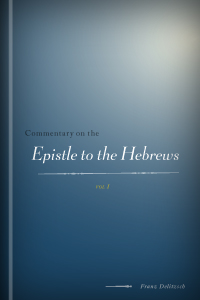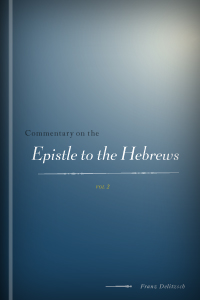Commentary on the Epistle to the Hebrews (2 vols.)
Digital Logos Edition
Overview
Franz Delitzsch was a German Lutheran scholar known for bringing creativity and fresh perspectives to his study of Scripture. His works range from biblical psychology to interpretation of Hebrew literature, but always utilize a keen scholarly eye. Commentary on the Epistle to the Hebrews (2 vols.) is known as one of Franz Delitzsch’s finer exegetical works, offering exposition of the text, textual criticism, semantic interpretation, and clarification on key doctrine. Volume one provides exegesis on chapters one through six, and volume two covers chapters seven through 13.
With Logos Bible Software, these commentaries are enhanced with cutting-edge research tools. Scripture citations appear on mouseover in your preferred English translation. Important terms link to dictionaries, encyclopedias, and a wealth of other resources in your digital library. Powerful topical searches help you find exactly what you’re looking for. With Logos Bible Software, the most efficient and comprehensive research tools are in one place, so you get the most out of your study.

Key Features
- Considered one of Franz Delitzsch’s finer exegetical works
- Offers detailed exposition of the entire book of Hebrews
- Studies textual criticism, semantic interpretation, and key doctrines in the text
Praise for the Print Edition
In this present commentary his thorough acquaintance with both Rabbinical and Alexandrian Jewish literature enables him to take clear and strong grounds in regard to the process by which public religious thought was bridged over from the old covenant to the new.
—The Methodist Quarterly Review
Product Details
- Title: Commentary on the Epistle to the Hebrews
- Volumes: 2
- Pages: 940
Individual Titles
- Commentary on the Epistle to the Hebrews, vol. 1 by Franz Delitzsch
- Commentary on the Epistle to the Hebrews, vol. 2 by Franz Delitzsch
This title is included in the following collections
You can save when you purchase this product as part of a collection.
Classic Commentaries and Studi...
$61.99$61.99Logos 7 Lutheran Platinum Lega...
$1,499.99$1,499.99Logos 6 Lutheran Platinum Lega...
$1,499.99$1,499.992025 Lutheran Diamond
$2,999.99$2,249.99
- $2,999.99
- $4,749.99$3,562.49
- $17,553.16$3,699.99
- $4,749.99
- $11,399.99
- $11,399.99
- $23,999.99$17,999.99
- $21,749.99
- $24,999.99

Known as being one of Franz Delitzsch’s finer exegetical works, Commentary on the Epistle to the Hebrews offers exposition of the text, textual criticism, semantic interpretation, and clarification on key doctrine. Volume one provides exegesis on chapters one through six.

Known as being one of Franz Delitzsch’s finer exegetical works, Commentary on the Epistle to the Hebrews offers exposition of the text, textual criticism, semantic interpretation, and clarification on key doctrine. Volume two provides exegesis on chapters seven through 13.
About Franz Delitzsch
Franz Delitzsch (1813–1890) was professor of theology at the University of Rostock from 1846 to 1850, University of Erlangen from 1851 to 1867, and University of Leipzig from 1867 to 1890. Delitzsch is notable for his translation of the New Testament.